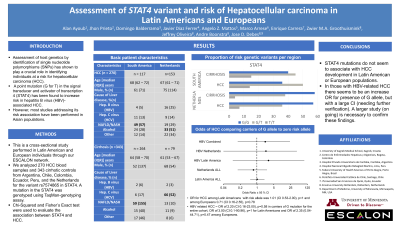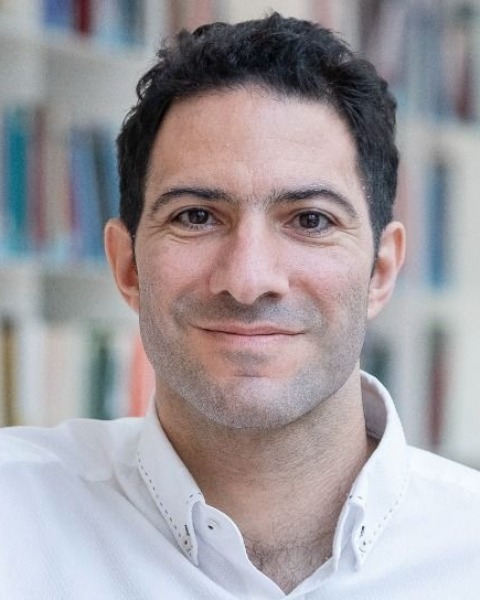Back


Poster Session A - Sunday Afternoon
Category: Liver
A0470 - Assessment of STAT4 Variant and Risk of Hepatocellular Carcinoma in Latin Americans and Europeans
Sunday, October 23, 2022
5:00 PM – 7:00 PM ET
Location: Crown Ballroom

Has Audio

Jose D. Debes, MD, PhD
University of Minnesota
Minneapolis, MN
Presenting Author(s)
Alan Ayoub, 1, Jhon Prieto, MD2, Domingo Balderramo, MD3, Javier Diaz Ferrer, MD4, Angelo Mattos, MD, PhD5, Marco Arrese, MD6, Enrique Carrera, MD7, Zwier Groothuismink, 8, Jeffrey Oliveira, 8, Andre Boonstra, PhD8, Jose D. Debes, MD, PhD9
1University of Zagreb Medical School, Zagreb, Grad Zagreb, Croatia; 2Centro de Enfermedades Hepaticas y Digestives, Bogota, Distrito Capital de Bogota, Colombia; 3Hospital Privado Universitario de Córdoba, Cordoba, Cordoba, Argentina; 4Hospital Nacional Edgardo Rebagliati Martins, Lima, Lima, Peru; 5Federal University of Health Sciences of Porto Alegre, Porto Alegre, Rio Grande do Sul, Brazil; 6Pontificia Universidad Católica de Chile, Santiago, Region Metropolitana, Chile; 7Universidad San Francisco de Quito, Quito, Pichincha, Ecuador; 8Erasmus University Rotterdam, Rotterdam, Zuid-Holland, Netherlands; 9University of Minnesota, Minneapolis, MN
Introduction: Assessment of host genetics by identification of single nucleotide polymorphisms (SNPs) has shown to play a crucial role in identifying individuals at a risk for hepatocellular carcinoma (HCC). A point mutation (G for T) in the signal transducer and activator of transcription 4 (STAT4) has been found to increase risk in hepatitis B virus (HBV)-associated HCC. However, most studies addressing its risk association have been performed in Asian populations
Methods: This is a cross-sectional study performed in Latin American and European individuals through our ESCALON network. We analyzed 270 HCC blood samples and 343 cirrhotic controls from Argentina, Chile, Colombia, Ecuador, Peru, and the Netherlands for the variant rs7574865 in STAT4. A mutation in the STAT4 was genotyped using TaqMan-genotyping assay. Chi-Squared and Fisher’s Exact test were used to evaluate the association between STAT4 and HCC.
Results: The median age for HCC in South Americans was 68 y/o (IQR 62-72) and in Europeans 67 y/o (IQR 61-71), with 61% and 75% being males, respectively. The proportions of individuals who developed HCC with a risk SNP (GG/GT) in the STAT4 gene was 85% in the Latin American cohort and 93% in the European one, as well as 85% and 96% respectively for cirrhotics without HCC. The calculated Odds-Ratio (OR) for HCC among Latin Americans with the G/G or G/T mutation in the STAT4 gene was 1.01 (CI 0.53-2.00, p=1) and among Europeans 0.71 (CI 0.16-2.55, p=0.78), suggesting and inverse association risk, but of low significance.
When evaluating HBV-related HCC specifically (11% of cases) we found OR of 2.20 (CI 0.16-23.00, p=0.58) in carriers of G mutation for the entire cohort, and OR of 3.00 (CI 0.1-90.96, p=1) for Latin Americans and OR of 2.35 (0.04-44.71, p=0.47) among Europeans. When comparing the TT genotype to GT and GG we found OR of 0.43 (CI 0.02-28.00, p=0.47) suggesting a protective effect in this population.
Discussion: STAT4 mutations do not seem to associate with HCC development in Latin American or European populations, likely due to a much higher prevalence of GG alleles than in Asians. In those with HBV-related HCC there seems to be an increased OR for presence of G mutation, but with a large CI (needing further verification). A larger study is ongoing to confirm these findings.
Disclosures:
Alan Ayoub, 1, Jhon Prieto, MD2, Domingo Balderramo, MD3, Javier Diaz Ferrer, MD4, Angelo Mattos, MD, PhD5, Marco Arrese, MD6, Enrique Carrera, MD7, Zwier Groothuismink, 8, Jeffrey Oliveira, 8, Andre Boonstra, PhD8, Jose D. Debes, MD, PhD9. A0470 - Assessment of STAT4 Variant and Risk of Hepatocellular Carcinoma in Latin Americans and Europeans, ACG 2022 Annual Scientific Meeting Abstracts. Charlotte, NC: American College of Gastroenterology.
1University of Zagreb Medical School, Zagreb, Grad Zagreb, Croatia; 2Centro de Enfermedades Hepaticas y Digestives, Bogota, Distrito Capital de Bogota, Colombia; 3Hospital Privado Universitario de Córdoba, Cordoba, Cordoba, Argentina; 4Hospital Nacional Edgardo Rebagliati Martins, Lima, Lima, Peru; 5Federal University of Health Sciences of Porto Alegre, Porto Alegre, Rio Grande do Sul, Brazil; 6Pontificia Universidad Católica de Chile, Santiago, Region Metropolitana, Chile; 7Universidad San Francisco de Quito, Quito, Pichincha, Ecuador; 8Erasmus University Rotterdam, Rotterdam, Zuid-Holland, Netherlands; 9University of Minnesota, Minneapolis, MN
Introduction: Assessment of host genetics by identification of single nucleotide polymorphisms (SNPs) has shown to play a crucial role in identifying individuals at a risk for hepatocellular carcinoma (HCC). A point mutation (G for T) in the signal transducer and activator of transcription 4 (STAT4) has been found to increase risk in hepatitis B virus (HBV)-associated HCC. However, most studies addressing its risk association have been performed in Asian populations
Methods: This is a cross-sectional study performed in Latin American and European individuals through our ESCALON network. We analyzed 270 HCC blood samples and 343 cirrhotic controls from Argentina, Chile, Colombia, Ecuador, Peru, and the Netherlands for the variant rs7574865 in STAT4. A mutation in the STAT4 was genotyped using TaqMan-genotyping assay. Chi-Squared and Fisher’s Exact test were used to evaluate the association between STAT4 and HCC.
Results: The median age for HCC in South Americans was 68 y/o (IQR 62-72) and in Europeans 67 y/o (IQR 61-71), with 61% and 75% being males, respectively. The proportions of individuals who developed HCC with a risk SNP (GG/GT) in the STAT4 gene was 85% in the Latin American cohort and 93% in the European one, as well as 85% and 96% respectively for cirrhotics without HCC. The calculated Odds-Ratio (OR) for HCC among Latin Americans with the G/G or G/T mutation in the STAT4 gene was 1.01 (CI 0.53-2.00, p=1) and among Europeans 0.71 (CI 0.16-2.55, p=0.78), suggesting and inverse association risk, but of low significance.
When evaluating HBV-related HCC specifically (11% of cases) we found OR of 2.20 (CI 0.16-23.00, p=0.58) in carriers of G mutation for the entire cohort, and OR of 3.00 (CI 0.1-90.96, p=1) for Latin Americans and OR of 2.35 (0.04-44.71, p=0.47) among Europeans. When comparing the TT genotype to GT and GG we found OR of 0.43 (CI 0.02-28.00, p=0.47) suggesting a protective effect in this population.
Discussion: STAT4 mutations do not seem to associate with HCC development in Latin American or European populations, likely due to a much higher prevalence of GG alleles than in Asians. In those with HBV-related HCC there seems to be an increased OR for presence of G mutation, but with a large CI (needing further verification). A larger study is ongoing to confirm these findings.
Disclosures:
Alan Ayoub indicated no relevant financial relationships.
Jhon Prieto indicated no relevant financial relationships.
Domingo Balderramo indicated no relevant financial relationships.
Javier Diaz Ferrer indicated no relevant financial relationships.
Angelo Mattos indicated no relevant financial relationships.
Marco Arrese indicated no relevant financial relationships.
Enrique Carrera indicated no relevant financial relationships.
Zwier Groothuismink indicated no relevant financial relationships.
Jeffrey Oliveira indicated no relevant financial relationships.
Andre Boonstra indicated no relevant financial relationships.
Jose Debes indicated no relevant financial relationships.
Alan Ayoub, 1, Jhon Prieto, MD2, Domingo Balderramo, MD3, Javier Diaz Ferrer, MD4, Angelo Mattos, MD, PhD5, Marco Arrese, MD6, Enrique Carrera, MD7, Zwier Groothuismink, 8, Jeffrey Oliveira, 8, Andre Boonstra, PhD8, Jose D. Debes, MD, PhD9. A0470 - Assessment of STAT4 Variant and Risk of Hepatocellular Carcinoma in Latin Americans and Europeans, ACG 2022 Annual Scientific Meeting Abstracts. Charlotte, NC: American College of Gastroenterology.
